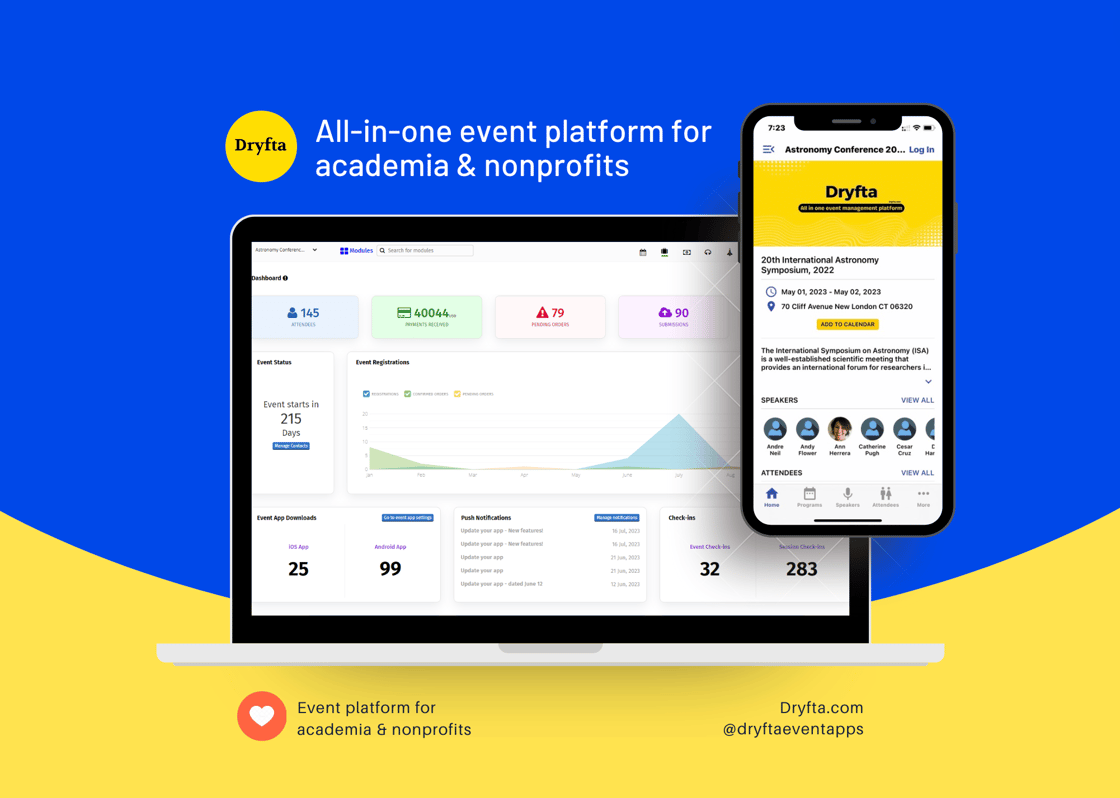
As we head into the final stretch of the year, we’re excited to share some powerful new features that have just been added to Dryfta. These updates are designed to make your event planning more efficient and your events even more impactful.
Powerful, Enterprise-Grade Event Management Software
Sell tickets & Collect registration fees online

Full-Service Abstract Management Software: Collect ➩ Assign ➩ Review ➩ Decide ➩ Notify
Customizable forms to collect & review abstracts, symposia, proposals & grants

The Complete Event Schedule Builder to Create Virtual & Hybrid Sessions
Create Event Schedule with Slides, Group Chats, Survey forms & more

Engagement Tools to Host Virtual Conferences & Online Community Website
Engage attendees & Produce knowledge with online networking portal

Secure, scalable event management for large enterprises with full data control
Simplify academic conferences and university event management
Powerful tools to manage multiple clients and events seamlessly
Insights and trends on event management and technology
Latest features and improvements in Dryfta
Step by step resources to maximize your event’s potential
Connect Dryfta with your favorite tools and platforms
Real success stories from events powered by Dryfta

As we head into the final stretch of the year, we’re excited to share some powerful new features that have just been added to Dryfta. These updates are designed to make your event planning more efficient and your events even more impactful.

In our ongoing commitment to enhancing the functionality and user experience of our platform, Dryfta is thrilled to introduce a set of impactful updates to our submission and review processes. These new features are designed to provide more control and flexibility for organizers, improve transparency for authors, and streamline the overall workflow.
Collaboration is the cornerstone of any successful research or academic event. Recognizing this, we’re excited to announce a significant update to Dryfta’s Abstract Submission System that makes adding co-authors a breeze. This update introduces new options for submitters to add co-authors either by searching our existing database or by manually entering details, or even both. Let’s explore how this new feature can enhance your abstract management experience.

We are excited to announce a significant update to Dryfta’s abstract management system. This update revolutionizes the way abstract submissions are managed, making the process more streamlined, error-free, and robust than ever. Now, event organizers can enable AI-powered checks for Grammar, Plagiarism, and Overall Quality for abstract submissions. This functionality extends not only to the default title and summary fields but also to any custom textarea fields that you may have in your submission form.
It is crucial for university event organizers to efficiently manage abstract submissions for conferences and scientific events. The latest advancement in Dryfta abstract submission software introduces a powerful feature known as “Tags.” This functionality enables organizers to create “stages” and assigning these “tags” or “stages” to abstracts. This article explores how the Tags function enhances the abstract submission process and allows organizers to streamline their workflow effectively.

The peer-review system has been around as part of the medical scene since the early 1800s. While the peer review system has its fair share of detractors it is still highly regarded in most circles as the best method we have for evaluating academic work.
So, what is a peer review system, and what should it be included to ensure you are delivering a paper or abstract that has the best chance of success?